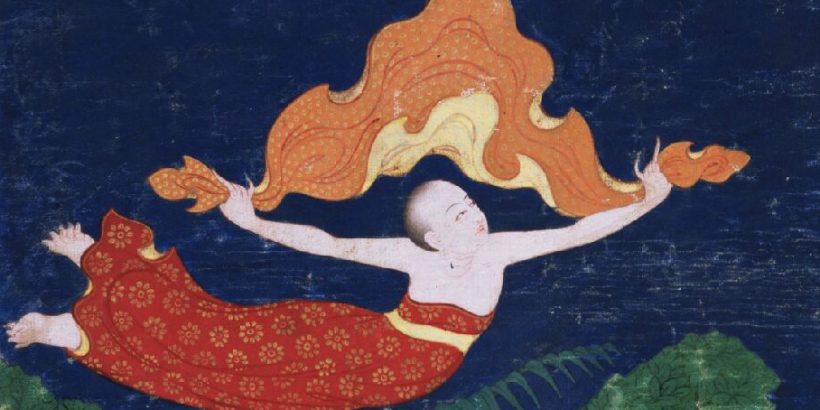Có những người mà ngũ độc trong họ thường nổi lên hết sức mạnh mẽ – đó là những cảm xúc tiêu cực như căm ghét kẻ thù, si mê bạn bè và những người thân thuộc và v.v.. Đôi khi họ cũng mong ước rằng họ có thể thực hành một ít Giáo Pháp chân chính. Nhưng ngũ độc quá mạnh, thường xuyên thống trị tâm thức họ và ngăn cản họ không bao giờ để họ có thể thành tựu Giáo Pháp một cách đúng đắn.
Có những người rất ngu đần, thậm chí không có chút thông tuệ nào, những người này có thể đến với Giáo Pháp nhưng bởi vì họ không thể hiểu được ngay cả một từ vựng nào của giáo lý hay một ý nghĩa nào của giáo lý, nên họ không thể tu học hay quán chiếu và thiền định về Pháp.
Một khi người ta được một ông thầy giả mạo nhận làm đệ tử và giảng dạy cho họ nghe về những quan điểm sai lạc và dạy cho họ hành động trong một cách thế lầm lạc, thì tâm thức họ sẽ bị dẫn dắt đi trên con đường sai lạc và không phù hợp với Giáo Pháp chân chính.
Có những người muốn học Pháp nhưng quá lười biếng, không có lấy một chút kiên nhẫn nào, những người ấy sẽ chẳng bao giờ thành tựu bởi họ bị sập bẫy quá nặng trong chính sự lười nhác và chần chừ do dự của chính mình.
Có những chướng ngại và ác hạnh của một số người mạnh mẽ tới nỗi, mặc dù họ có nỗ lực tu hành Giáo Pháp đến mấy chăng nữa, họ cũng sẽ thất bại trong việc phát khởi những phẩm tính tốt lành trong tâm thức họ. Những ác hạnh chồng chất nhiều kiếp làm cho họ choáng ngợp. Họ sẽ đánh mất tín tâm vào giáo lý mà không nhận ra rằng tất cả là do những hành vi của chính họ trong quá khứ.
Có những người bị làm nô lệ cho người khác và đánh mất quyền tự chủ, những người này có thể muốn thực hành Pháp nhưng chủ của họ không cho phép họ tu hành.
Có một số người tìm đến với Giáo Pháp vì mang trong lòng những sợ hãi về cuộc đời này – họ sợ họ có thể thiếu thực phẩm hay quần áo, hoặc sợ phải trải qua những phiền não khác. Nhưng bởi họ không có lòng tin tưởng sâu xa nơi Pháp, nên họ tự nộp mình cho những huân tập xưa cũ của họ và để cho họ bị dính mắc vào những sự việc không phải là Pháp.
Còn thêm những người khác là người giả mạo. Qua việc khoe khoang Giáo Pháp, họ cố gắng thâu đoạt của cải, muốn được cung phụng và muốn có uy tín. Đứng trước người khác, họ đội lốt hành giả, nhưng trong tâm thức thì họ chỉ quan tâm tới cuộc đời này, vì thế họ đã lià xa con đường giải thoát.
Đây là tám hoàn cảnh khiến cho con người không thể tiếp tục tu tập thực hành Giáo Pháp.
English Version
THESE ARE EIGHT CIRCUMSTANCES THAT RENDER IT IMPOSSIBLE TO CONTINUE PRACTISING THE DHARMA.
The eight incompatible propensities that leave no freedom to practise the Dharma
People who are tightly bound to their worldly commitments, wealth, pleasures, children, relatives and so forth, are so preoccupied with the strenuous efforts entailed by these things that they have no time to practise the Dharma.
Some people lack any scrap of humanity, and their nature is so depraved that they are unable to improve their behaviour. Even a genuine
spiritual teacher would find it very difficult to set them on the noble path. As the sublime beings of the past said, “The abilities of a disciple can be shaped, but not his basic character.”
A person who feels not the slightest consternation either on hearing of
lower. rebirths and the ills of sarilsara, or in the face of this present life’s
suffedngs, has no determination whatsoever to liberate himself from sarilsa~a, and therefore no reason to engage in Dharma practice.
To have no faith at all, either in the true Dharma or in the teacher, shuts off any access to the teachings and bars entry to the path of liberation.
People who take pleasure in harmful or negative actions, and who fail to control their thoughts, words and deeds, are devoid of any noble qualities and have turned away from the Dharma.
Some people are no more interested in spiritual values and Dharma than a dog in eating grass. Since they feel no enthusiasm for the Dharma, its qualities will never develop in their minds.
Anyone who, having entered the Basic Vehicle, breaks his vows and commitment to bodhicitta, has nowhere else to go but the lower realms. He will not escape from states where there is no opportunity to practise the Dharma.
Anyone who, having entered the Secret Mantra Vehicle, breaks his samaya commitments to his teacher and spiritual brothers and sisters, will bring about his own ruin and theirs, destroying any prospect of accom-plishments.
These are eight propensities that lead one away from the Dharma and snuff out the lamp of liberation.
Before these sixteen factors that leave no opportunity for the practice have been carefully ruled out, people in these decadent times may look as if they have all the freedoms and advantages and are true practitioners of the Dharma. However, the chieftain upon his throne and the lama beneath his parasol,34 the hermit in his mountain solitude, the man who has renounced the affairs of state, and anyone who might have a high opinion of his own worth-each may think he is practising Dharma, but as long as he is under the sway of these additional limiting conditions, he is not on the true path.
So, before blindly assuming the forms of Dharma, check your own state carefully first to see whether or not you have all thirty-four aspects of the freedoms and advantages. If you do have them all, rejoice and reflect deeply on them over and over again. Remind yourself how, now that you have finally gained these freedoms and advantages that are so difficult to find, you are not going to squander them; whatever happens, you are going to practise the true Dharma. Should you find, however, that some aspects are missing, try to acquire them by whatever means may be possible.
At all times, you should take pains to examine carefully whether or not you have all elements of the freedoms and advantages. If you fail to check, and any one of those elements should be lacking, you will be missing the chance to practise the Dharma truly. Mter all, even the execution of a single minor everyday task requires many mutually dependent materials and conditions to be brought together. Is it any wonder that the realiza-tion of our ultimate goal-the Dharma-is impossible without the con-junction of many interconnected factors?
Imagine a traveller who wants to brew himself some tea. The making of tea involves many different elements-the pot, the water, the wood, the fire, and so on. Of these, just to light the fire alone is impossible without a flint, steel, some tinder, the traveller’s hands and so forth. If just one thing is missing, the tinder for instance, then the fact that the traveller has everything else he needs is of no use whatsoever. He simply does not have what it takes to make tea. In the same way, if even one element of the freedoms and advantages is missing, there is no chance at all of practising the true Dharma.
If you check your own mind carefully, you will see that even the basic eight freedoms and ten advantages are very difficult to attain, and that to have all ten advantages is even rarer than to have all eight freedoms.
Someone born as a human, with all his faculties intact and in a central region, but who becomes involved in a lifestyle conflicting with the Dharma and who has no faith in the Conqueror’s teaching, only has three of the advantages. Were he to obtain either of the two others, he would still only have four. Now, to have a lifestyle which does not conflict at all with the Dharma is extremely hard. If any of a person’s thoughts, words and deeds are negative and his motives are for this life, then in fact, even if he has the reputation of a good and learned man, his lifestyle is in conflict with the Dharma.
The same applies to the five circumstantial advantages. If a Buddha has come, has taught the Dharma and the teachings still exist, yet a person has not entered the Dharma, that person has only three of those advan-tages. Here again, “entering the Dharma” does not simply mean asking for some teaching and being given it. The starting point of the path of liberation is the conviction that the whole of sarilsara is meaningless and the genuine determination to be free from it. To travel the path of the Great Vehicle, the essential is to have genuinely aroused bodhicitta. The minimum is to have such unshakeable faith in the Three Precious Jewels that you would never renounce them, even to save your life. Without that, simply reciting prayers and wearing yellow robes is no proof that you have entered the Dharma.
Make sure that you know how to identify each of these freedoms and advantages, and to check whether you have them yourself. This is of crucial importance.
Đức Patrul Rinpoche
Trích: Lời Vàng Của Thầy Tôi

